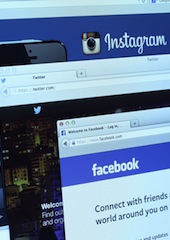United States of Twittermania
Reflections on an IPO and beyond.
November 7, 2013

Don’t get me wrong: I like Twitter. It’s a nifty communications tool. But I fail to see that it’s much of a business — just like quite a few other things Silicon Valley has come up with.
Just ask yourself this question: Other than large corporations, who would actually pay money to send out tweets? And generating revenues via advertising will soon become a real nuisance on the small screen.
So this option is a very limited money-making option as well, lest the service make itself more trouble than it’s worth to users.
Lest I call be called a technophobe or moron, of course I know the officially sanctioned mantra. It goes like this: There is technology and then there is applied technology. The technology has been invented and there are no great breakthroughs on the horizon. Technology has become commoditized. It is manufactured in Chinese sweatshops.
In contrast to downtrodden China, glorious America – aka Silicon Valley – supposedly now stands on the precipice of a revolution in which the now-cheap technology will be applied to more and more expansive uses.
I have two concerns in that regard: First, what if much of that turns out to be self-serving ideology? Second, isn’t the current hype the only way in which the Valley can celebrate itself? If those concerns hold true, then it may not just be game over for mass commoditization of tech products a la China, but also for the Valley.
Cutesy, flag-waving language distorts any rational investment model and creates what can, at best, be described as a pseudo business case.
The logic underlying the current Twitter IPO (and whatever else is slated to “go public” in the same pipeline wave) goes as follows: Twitter may not not be a real business, alright. But at least it’s incorporated as a company and the titans of the Valley have invested in the idea. And people think that’s enough to make the business case.
So the time has come for the titans to earn their spoils for shepherding the project along to this point.
But this is where the trouble arises: In order to distribute some of the gains the kings of the Valley feel entitled to, the shaky business reality must be made to fit the risky investor/reward game. As even the SEC has just warned, this essentially leads to the creation of a pseudo business case, as was the case with the previous bubble.
Mind you, the people who are being rewarded are not the general public (which may be buying into the next AOL), but the Valley kingpins, mainly the VCs and PEs, as well as the banks who are taking them public, plus a few happy insiders who originally came up with a winning idea.
Don’t get me wrong. Twitter does have considerable value, but it’s essentially a social value. That’s an excellent thing to create, but very hard, if not impossible to monetize.
The point of the argument is not so much that the company has never shown a profit yet before going public, which makes it unlike Google and very much like Amazon (to this day).
In fact, all of these tools have their value. For example, Jeff Bezos, CEO of Amazon — who officially keeps reinvesting, and thus doesn’t generate any profits — is doing a wonderful job at delivering products to people. He is so successful that in fact that his still largely untaxed online sales hollow out already strained state coffers.
The biggest challenge for Silicon Valley, not just viewed from a distance, is this: No doubt, it continues to come up with excellent ideas and even a few gadgets. And these can very well be of use for the public at large.
But so often, it’s gizmos, nifty widgets and apps — stuff that guys toying around may come up with. And I’m even prepared to say it’s valuable but, and here is the catch, in a non-monetary or, better yet: post-material sense.
Many of the issues Silicon Valley addresses are amazing nice-to-haves. You wouldn’t want to miss them on your iPhone or Android phone, if you could get them free. However, in most cases, you are not prepared to pay money for them.
All the Valley philosophers who have held forth on the “new free” and the other techno-evangelists do have a point. Value is being created. What they obscure in their enthusiasm or desperate attempt to make a case for generating money nevertheless is this:
Much of Silicon Valley is doing amazing things that will serve us well — in a quasi-Communist future, where people create great things without being able to charge for it.
They’ll have to do it for the thrill of serving the public at large. Imagine Twitter: After the initial code was written, and users essentially helped the “inventors” stumble into the true utility of their tool, the solution is easy: Twitter should be run as a public service.
Its main costs these days are buying server rack space, energy costs and the like. This suggests that Twitter should become something like C-SPAN, essentially a sponsored activity by an industry association that wants to raise public awareness in a positive fashion. Somebody with ample rack space in the cloud could run it as a public service.
The paradox of Silicon Valley, for all its past glory, is simply this: In a nation that is politically no longer able to engage in long-term projects, how can the Valley possibly succeed on the truly tough tasks of our time — say, energy and the environment, or health?
On many of these frontiers, what Silicon Valley will come up with will amaze. But the case for monetizing the “inventions” — if they are that — will become ever harder to make.
Takeaways
Like quite a few other things Silicon Valley has come up with, Twitter isn’t much of a business.
America supposedly stands on the precipice of a revolution that will apply cheap technology to expansive uses.
The time has come for Twitter’s backers to get theirs for shepherding it to this point, regardless of profitability.
To cash out, the kings of Silicon Valley must take unprofitable ventures public, creating a pseudo business case.
Tech IPOs reward Silicon Valley kingpins, not the general public (which may be buying into the next AOL).
Value is being created. But Silicon Valley is doing amazing things that will serve us well, but without profit.
Can an IPO-centric Silicon Valley even help on unprofitable public interest tasks (energy, environment, health)?
Read previous

The Coming U.S.-China Clash
November 7, 2013
